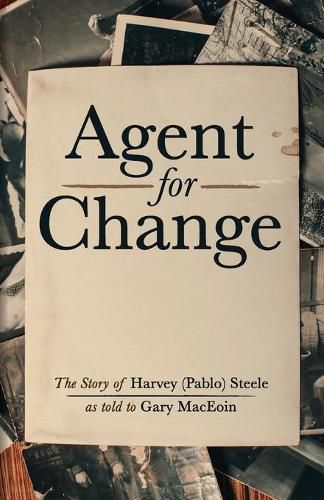Readings Newsletter
Become a Readings Member to make your shopping experience even easier.
Sign in or sign up for free!
You’re not far away from qualifying for FREE standard shipping within Australia
You’ve qualified for FREE standard shipping within Australia
The cart is loading…






This title is printed to order. This book may have been self-published. If so, we cannot guarantee the quality of the content. In the main most books will have gone through the editing process however some may not. We therefore suggest that you be aware of this before ordering this book. If in doubt check either the author or publisher’s details as we are unable to accept any returns unless they are faulty. Please contact us if you have any questions.
Few people deserve a biography, once observed a British writer, and of those even fewer get the biographer they deserve. Such, happily, has not been true of Harvey (Pablo) Steele. He richly deserves a biography and has found in Gary MacEoin a writer eminently equipped to understand and tell his story. It is the story, first, of a priest who has always managed to be where trouble is: First, China during the Japanese invasion, then a stint as an Air Force chaplain in the China-Burma-India theater. Next, to the Dominican Republic under Trujillo and presently in Panama, where the church seems set on a collision course with the state. Pablo Steele has had an interesting life, and Gary MacEoin unfailingly catches the excitement of mine strikes in Nova Scotia in Steele’s boyhood, the terror of Japanese air raids, and the Graham Greene atmosphere of living under several different types of totalitarianism. An interesting life, yes–but more significantly, an important one. Harvey Steele has been an agent for change–a stubborn social reformer who has never let realism darken his bright vision of what could be, and whose idealism insists that the future must be shaped now through study, work, and sacrifice. Credit unions and cooperatives unlocked the doors to a more human future for the miners of his native Nova Scotia. They could do the same in the Dominican Republic or Panama, argued Steele–and he has spent much of his life proving that argument. He has also embodied in his life the massive shift in attitude and awareness which has taken place within Christianity itself: the realization that the proper concern of the church is in the street as well as in the sanctuary and that slum housing and hunger are religious issues.
$9.00 standard shipping within Australia
FREE standard shipping within Australia for orders over $100.00
Express & International shipping calculated at checkout
This title is printed to order. This book may have been self-published. If so, we cannot guarantee the quality of the content. In the main most books will have gone through the editing process however some may not. We therefore suggest that you be aware of this before ordering this book. If in doubt check either the author or publisher’s details as we are unable to accept any returns unless they are faulty. Please contact us if you have any questions.
Few people deserve a biography, once observed a British writer, and of those even fewer get the biographer they deserve. Such, happily, has not been true of Harvey (Pablo) Steele. He richly deserves a biography and has found in Gary MacEoin a writer eminently equipped to understand and tell his story. It is the story, first, of a priest who has always managed to be where trouble is: First, China during the Japanese invasion, then a stint as an Air Force chaplain in the China-Burma-India theater. Next, to the Dominican Republic under Trujillo and presently in Panama, where the church seems set on a collision course with the state. Pablo Steele has had an interesting life, and Gary MacEoin unfailingly catches the excitement of mine strikes in Nova Scotia in Steele’s boyhood, the terror of Japanese air raids, and the Graham Greene atmosphere of living under several different types of totalitarianism. An interesting life, yes–but more significantly, an important one. Harvey Steele has been an agent for change–a stubborn social reformer who has never let realism darken his bright vision of what could be, and whose idealism insists that the future must be shaped now through study, work, and sacrifice. Credit unions and cooperatives unlocked the doors to a more human future for the miners of his native Nova Scotia. They could do the same in the Dominican Republic or Panama, argued Steele–and he has spent much of his life proving that argument. He has also embodied in his life the massive shift in attitude and awareness which has taken place within Christianity itself: the realization that the proper concern of the church is in the street as well as in the sanctuary and that slum housing and hunger are religious issues.